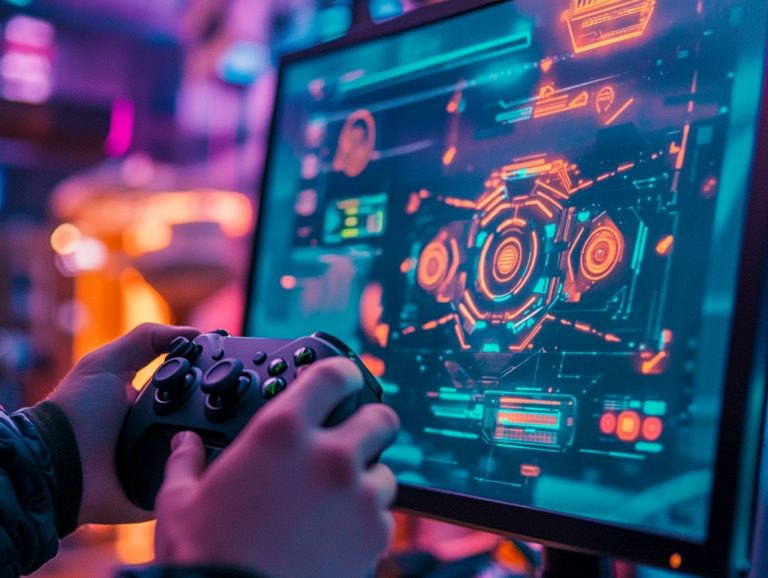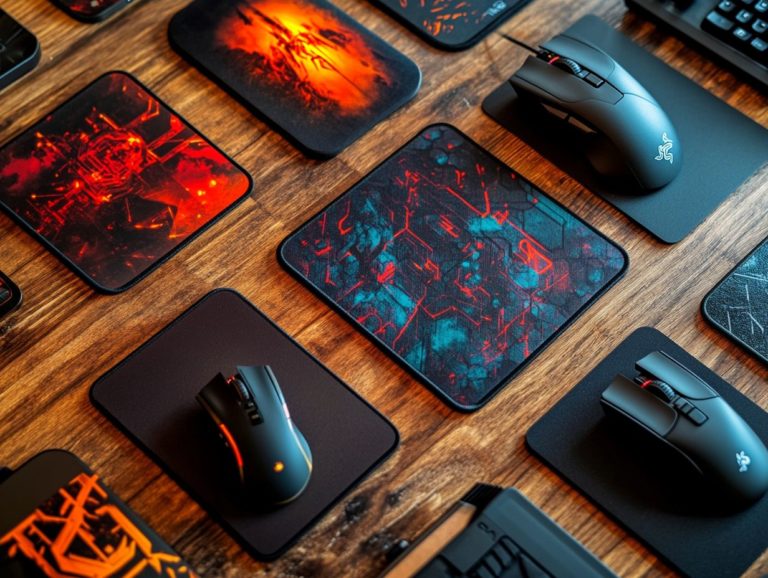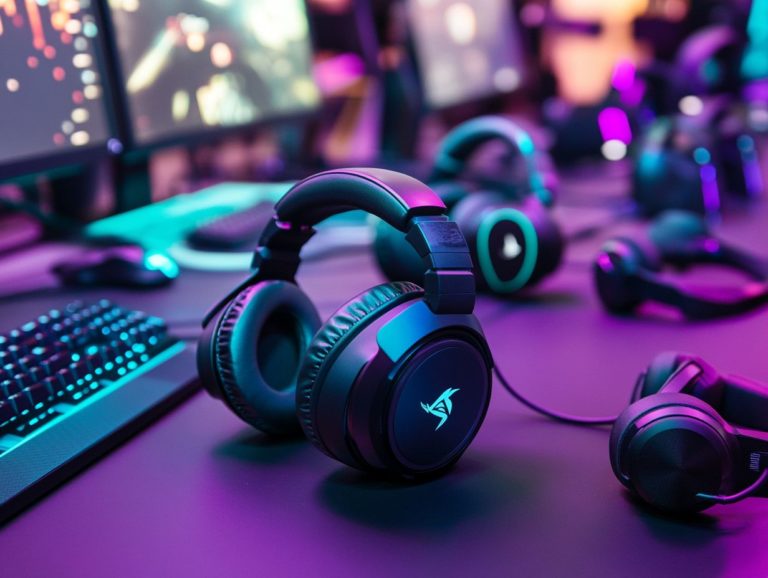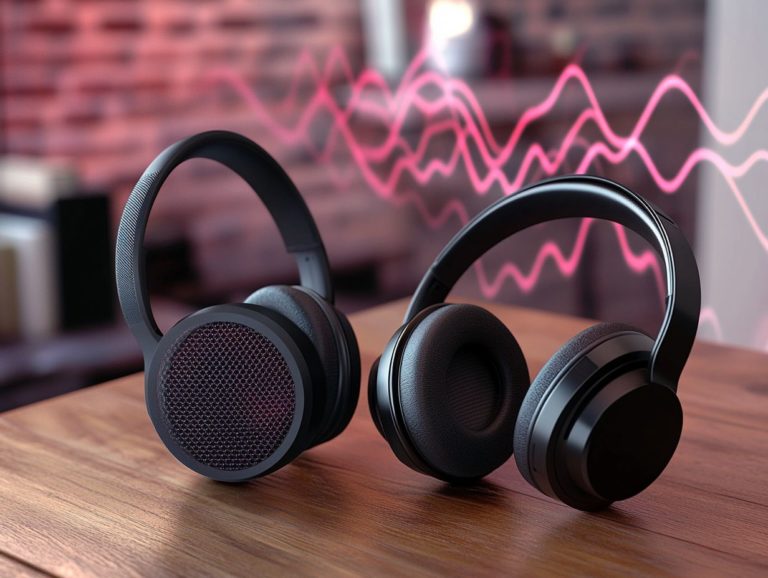what is the role of gaming hardware in esports?
Esports is taking the world by storm. Millions are captivated, making competitive gaming a legitimate career path.
The driving force behind this revolution is gaming hardware, which powers performance and sparks innovation.
If you’re an aspiring gamer or a passionate fan, understanding how technology impacts competitive success is key.
This article explores the history of esports and the critical role of gaming hardware. It will show you how optimizing your setup can drastically enhance your gameplay.
Join us as we dive into the future of gaming technology in this exciting, ever-evolving landscape.
Contents
- Key Takeaways:
- The Rise of Esports
- The Role of Gaming Hardware in Esports
- Key Components of Gaming Hardware
- Optimizing Gaming Hardware for Esports
- The Future of Gaming Hardware in Esports
- Frequently Asked Questions
- What is the role of gaming hardware in esports?
- Why is gaming hardware important in esports?
- What are some examples of gaming hardware used in esports?
- How does gaming hardware impact a player’s performance in esports?
- Can pro gamers use any gaming hardware?
- Is investing in high-quality gaming hardware necessary to succeed in esports?
Key Takeaways:
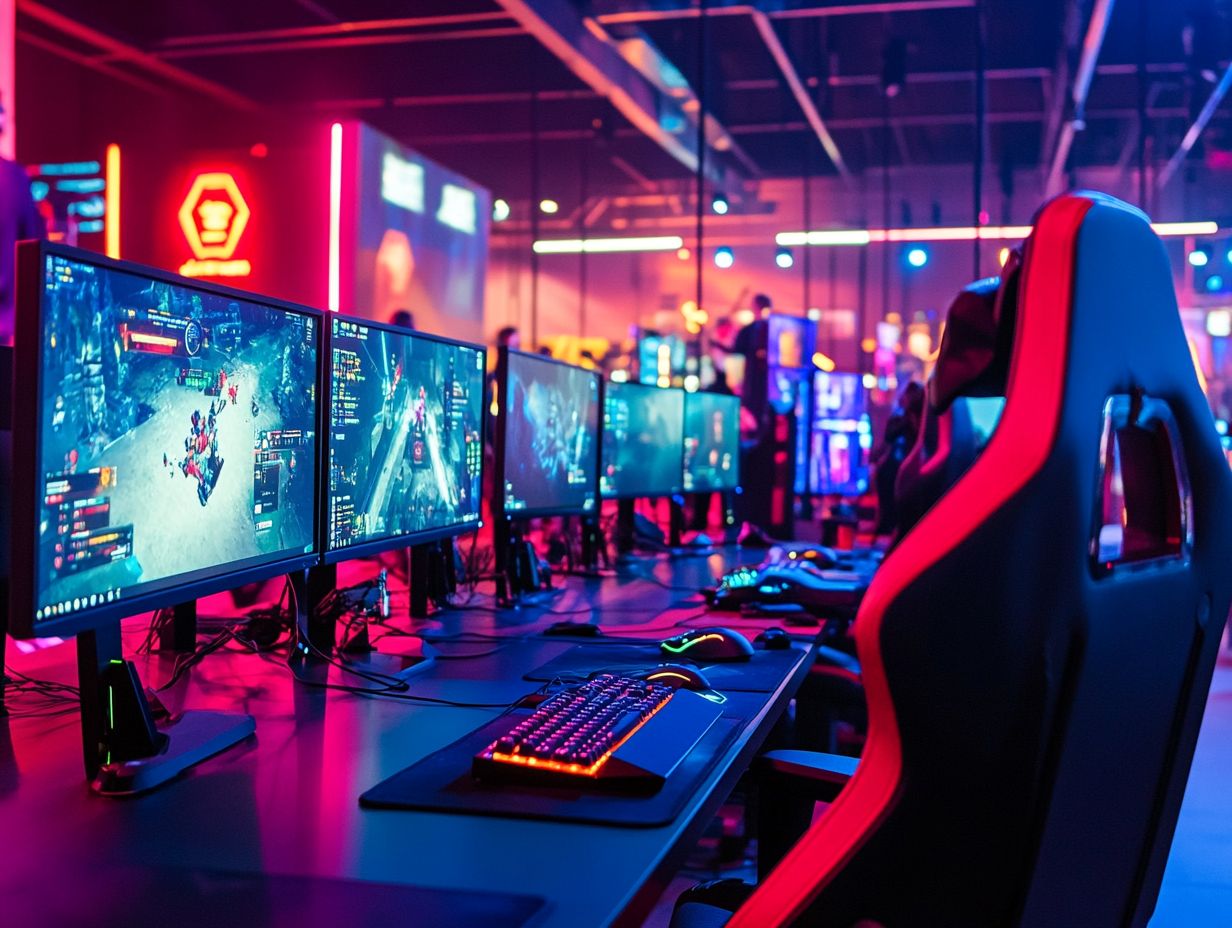
Gaming hardware is crucial in esports. High-performance equipment gives players an edge in competition.
PC gaming and peripherals allow for customization and precision, vital for professional gamers.
The future of gaming hardware is always changing, promising even more thrilling gameplay.
The Rise of Esports
The rise of esports has reshaped gaming, turning it into a multi-billion dollar industry. Professional gamers from around the world are drawn to this thrilling arena.
Popular titles like League of Legends and Overwatch League engage millions and create massive tournaments. These events showcase cutting-edge gaming gear and hardware innovations.
Esports is now a vital part of the global gaming market, reflecting the passion and skill of its participants.
A Brief History of Competitive Gaming
Competitive gaming’s history begins in the early arcade days. Players would compete for high scores, sparking spirited rivalries that led to organized tournaments.
These competitions laid the groundwork for a global phenomenon, inviting enthusiasts to showcase their skills in dynamic arenas.
As technology advanced, so did the platforms for competition. Landmark events, like the first ‘World Championship’ in 1980, paved the way for what was to come.
Over the decades, gaming peripherals such as precise mice and customizable keyboards have improved player experiences, ensuring fairness and enhancing gameplay.
Live-streamed esports has intensified fan passion, building vibrant communities that support professional gamers worldwide.
The Role of Gaming Hardware in Esports
In esports, the right gaming hardware is essential. Professional gamers rely on high-performance PCs and specialized tools like responsive mice and fast keyboards.
These devices are critical for gaining a competitive edge, allowing players to elevate their gameplay.
Why Hardware Matters in Competitive Gaming
Your hardware choice can greatly impact your performance. High-refresh-rate monitors provide smoother visuals, while advanced audio helps you stay aware during intense competitions.
It s not just about the screens; specifications like graphics cards and processors are essential for smooth gameplay. A refresh rate of 240Hz allows for quicker reactions to on-screen movements, especially in fast-paced shooters.
Low response times are also key, reducing lag so your actions happen almost instantly. A well-optimized setup boosts your gameplay, providing superior frame rates and reduced latency for a more immersive experience.
Key Components of Gaming Hardware
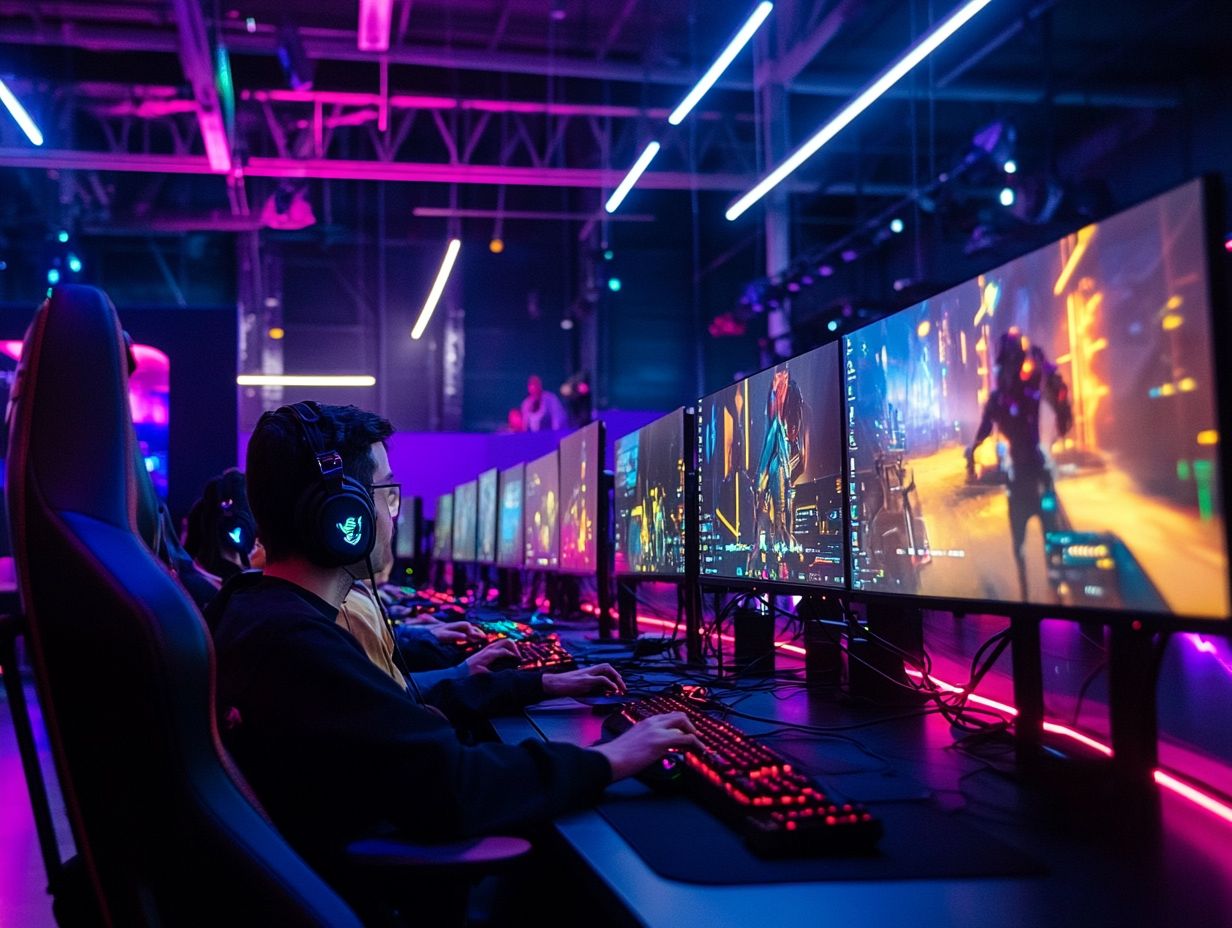
Essential components include CPUs, GPUs, and peripherals like mechanical keyboards and high-precision mice. Together, they create a powerful gaming PC.
This setup meets the demands of competitive gaming while enhancing your overall experience.
PC vs Console Gaming
The ongoing debate between PC and console gaming continues to shape the world of competitive gaming. As a competitive gamer, you might find yourself leaning towards PC setups. The versatility of gaming peripherals and superior hardware performance can be quite enticing.
It’s vital to weigh the benefits against the drawbacks of each platform. While PCs offer customizable configurations that can significantly enhance your gameplay, this often requires a higher initial investment and ongoing maintenance costs that could catch you off guard.
Consoles, on the other hand, provide a straightforward, plug-and-play experience. This simplicity makes them accessible and user-friendly, appealing to a broader audience who may not want to dive deep into the world of hardware.
Game selection is another critical factor. Certain titles may be exclusive to one platform or simply perform better on PCs, which can directly influence your competitive edge.
The choice of peripherals also matters. From high-DPI mice to mechanical keyboards, these tools can drastically improve your precision and comfort, underscoring how your hardware environment plays a significant role in your performance during competitive play.
The Importance of Peripherals
Gaming peripherals think mechanical keyboards with Cherry MX switches, ergonomic gaming mice, and high-quality headsets are game-changers that can define your performance in the fast-paced world of esports.
These tools are more than mere accessories; they can significantly influence your performance and often serve as the critical factor that distinguishes winners from losers.
For instance, mechanical keyboards deliver a satisfying click and feel that enhances your responsiveness when executing complex maneuvers. Gaming mice are meticulously designed to reduce hand fatigue, allowing you to maintain laser focus during marathon gaming sessions.
Premium headsets featuring surround sound technology give you the power to accurately pinpoint in-game sounds, providing the upper hand in detecting nearby opponents. This perfect blend of comfort, ergonomics, and high-performance features highlights the essential role these peripherals play in today s competitive gaming arena.
Optimizing Gaming Hardware for Esports
Optimizing your gaming hardware for esports means tailoring your builds and making strategic upgrades, all aimed at achieving peak performance. This meticulous attention to detail gives you the power to maintain a competitive edge in tournaments, ensuring that every millisecond counts when the stakes are high.
Custom Builds and Upgrades
Creating custom builds for gaming PCs allows you to tailor your setup with powerful CPUs (Central Processing Units) and GPUs (Graphics Processing Units) specifically suited to the demands of various esports competition formats. This level of personalization gives you the power to maximize your performance and ensure seamless gameplay.
When you embark on the journey of assembling your custom gaming rig, start by selecting a high-performance CPU, like AMD s Ryzen series or Intel s Core i9. These serve as the backbone for handling processing-intensive tasks.
Complementing that choice, a top-tier GPU, such as the NVIDIA GeForce RTX series, guarantees stunning visuals and smooth frame rates during competitive play.
There are numerous configurations to consider. Many professional gamers opt for setups that include ample RAM for effective multitasking and solid-state drives for rapid load times. This thoughtful approach ultimately enhances your gaming experience and gives you the competitive edge you seek.
Training and Practice Techniques
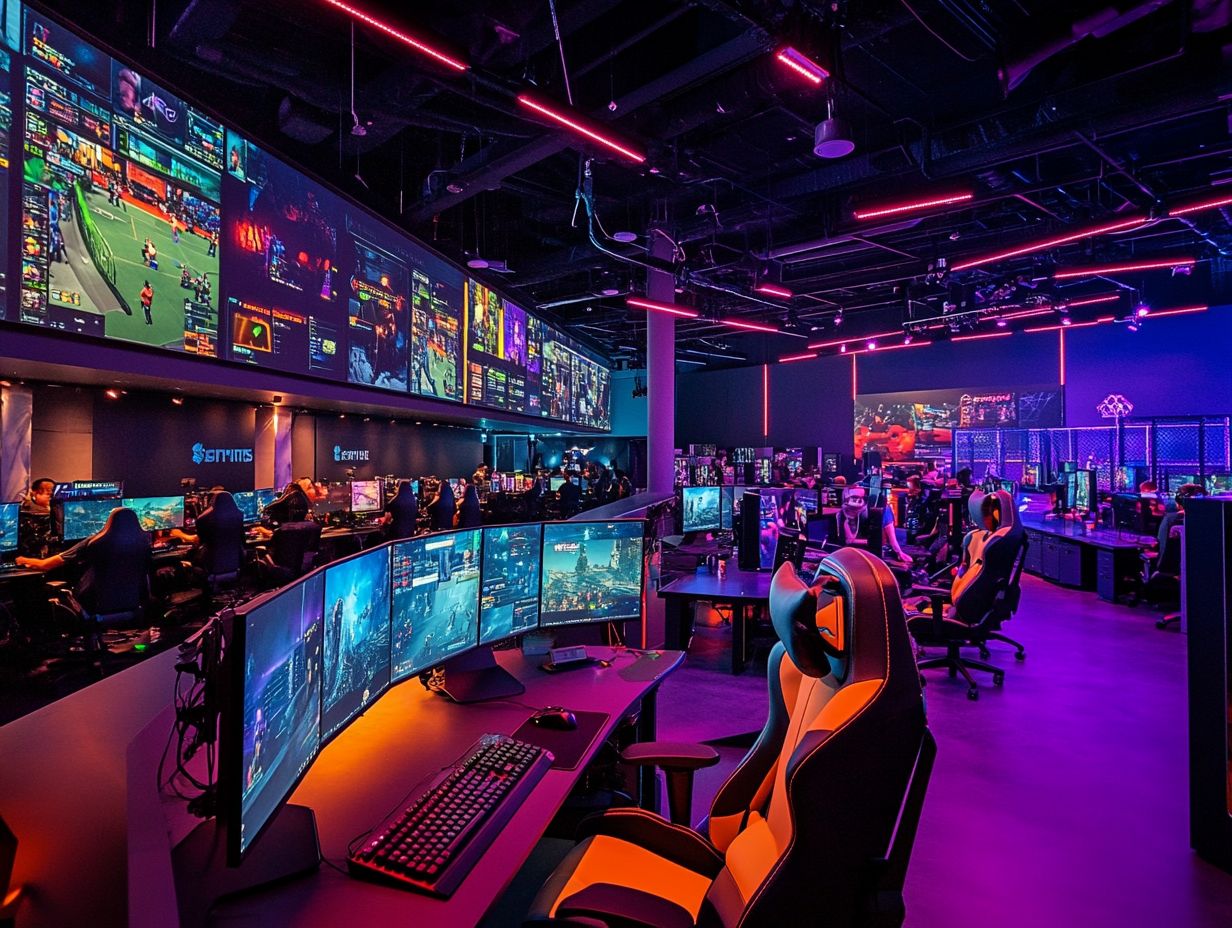
Effective training and practice techniques are vital for you as a professional gamer. They enable you to hone your skills and adapt seamlessly to various esports competition environments using top-tier gaming peripherals.
These techniques typically include a range of drills aimed at enhancing your reflexes, precision, and reaction times. Simulations offer invaluable opportunities to replicate the intensity of live matches, allowing you to practice under pressure while familiarizing yourself with diverse strategies.
Team coordination is equally essential; synchronized communication and tactics can truly make or break a match. Your choice of gaming peripherals such as specialized mice, keyboards, and headsets significantly impacts your overall performance.
These tools not only provide responsive feedback but also ensure improved comfort during long practice sessions, ultimately influencing your training outcomes.
Don’t underestimate the impact of quality peripherals on your success! Upgrade your gear and practice specific techniques to elevate your gaming skills and compete at the highest level!
The Future of Gaming Hardware in Esports
The future of gaming hardware in esports is on the brink of remarkable innovations. Expect advancements in gaming peripherals, CPUs, and GPUs that will redefine competitive gaming experiences for professional gamers.
Now is the most exciting time to be part of the gaming world, where technology and skill intersect in groundbreaking ways.
Advancements and Innovations
Recent advancements in gaming hardware, including faster refresh rates and enhanced audio feedback systems, are transforming how you engage in esports competition. High-resolution displays and low-latency monitors allow for smoother visuals and quicker responses during critical gameplay moments.
These new technologies significantly enhance immersion, giving you a competitive edge as you react more swiftly to in-game stimuli. Advancements in ergonomic designs and customizable peripherals enable you to tailor your setup to fit your unique playing style, ultimately boosting your efficiency and performance.
Collectively, these innovations elevate your overall gaming experience and raise the stakes for competitive play, pushing you to continuously adapt and refine your strategies.
Predictions and Speculations
As technology continues its rapid evolution, future gaming hardware will likely incorporate AI-driven enhancements that elevate the performance of gaming peripherals, especially in esports competition.
This transformation has the potential to redefine your interaction with gaming equipment, offering personalized setups that adapt in real-time to your playing style and skill level. Imagine blending emerging technologies like virtual reality and augmented reality with traditional gameplay, crafting immersive environments that captivate audiences and grant pro gamers fresh tactical advantages.
As these innovations gain traction, the esports landscape may experience a remarkable uptick in competition quality, drawing in more viewers and sponsors. Investors are likely to increasingly back talents equipped with cutting-edge gear, reshaping the industry’s economic framework.
Frequently Asked Questions
What is the role of gaming hardware in esports?
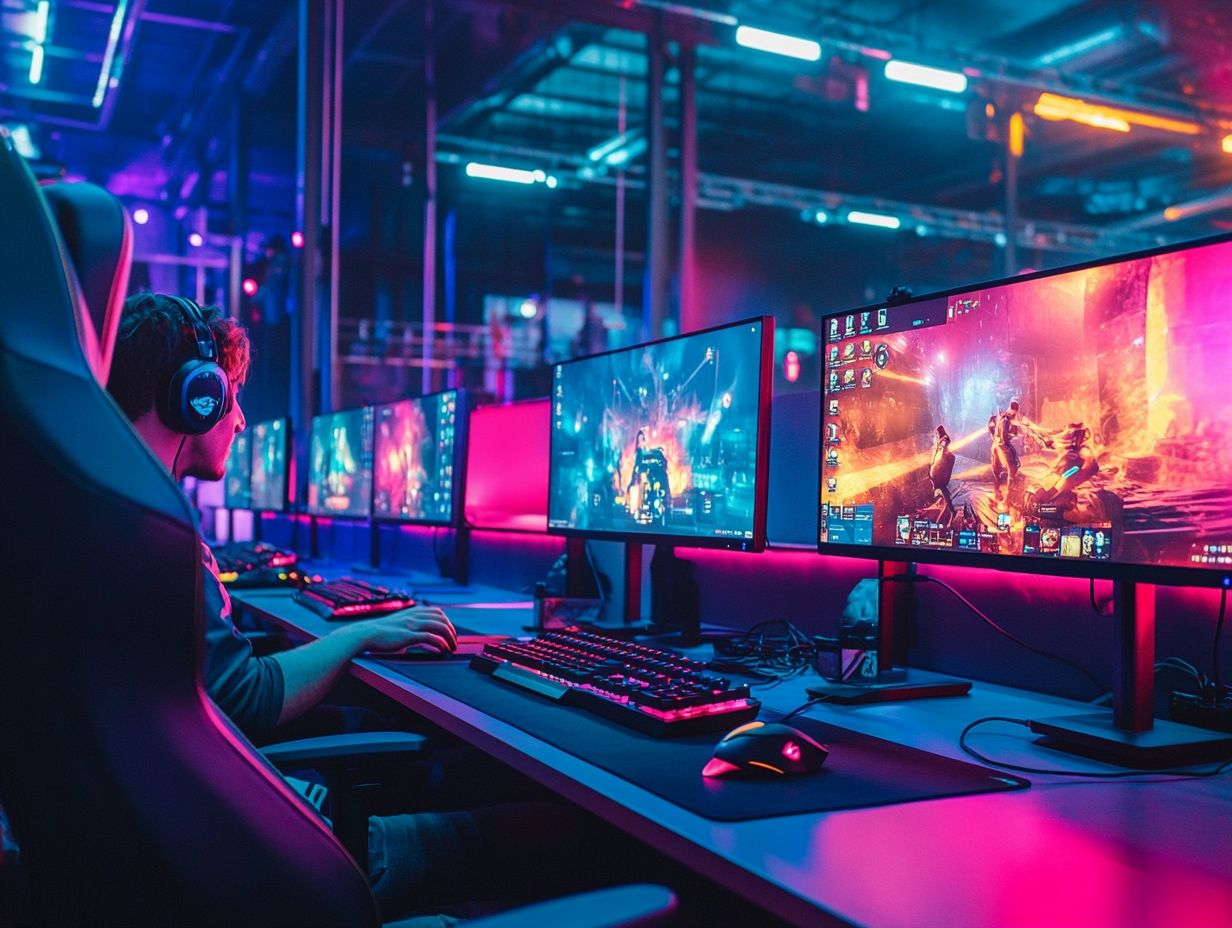
Gaming hardware plays a crucial role in esports as it directly affects a player’s performance and experience in competitive gaming.
Why is gaming hardware important in esports?
Gaming hardware is important in esports because it can give players an edge over their opponents by providing faster and more accurate inputs, better graphics, and smoother gameplay.
What are some examples of gaming hardware used in esports?
Examples of gaming hardware commonly used in esports include gaming mice, keyboards, headsets, monitors, and PCs.
How does gaming hardware impact a player’s performance in esports?
Gaming hardware impacts a player’s performance in esports by providing faster response times, more precise movements, and better visual clarity, allowing for quick and accurate decisions in the game.
Can pro gamers use any gaming hardware?
While some professional esports players may have personal preferences for certain gaming hardware, most professional teams have specific requirements and standards for the hardware their players use, often opting for high-end specialized equipment for optimal performance.
Is investing in high-quality gaming hardware necessary to succeed in esports?
While having high-quality gaming hardware can certainly give players an advantage, skill and practice are ultimately the most important factors in succeeding in esports. Nonetheless, reliable and responsive hardware can help players reach their full potential.

